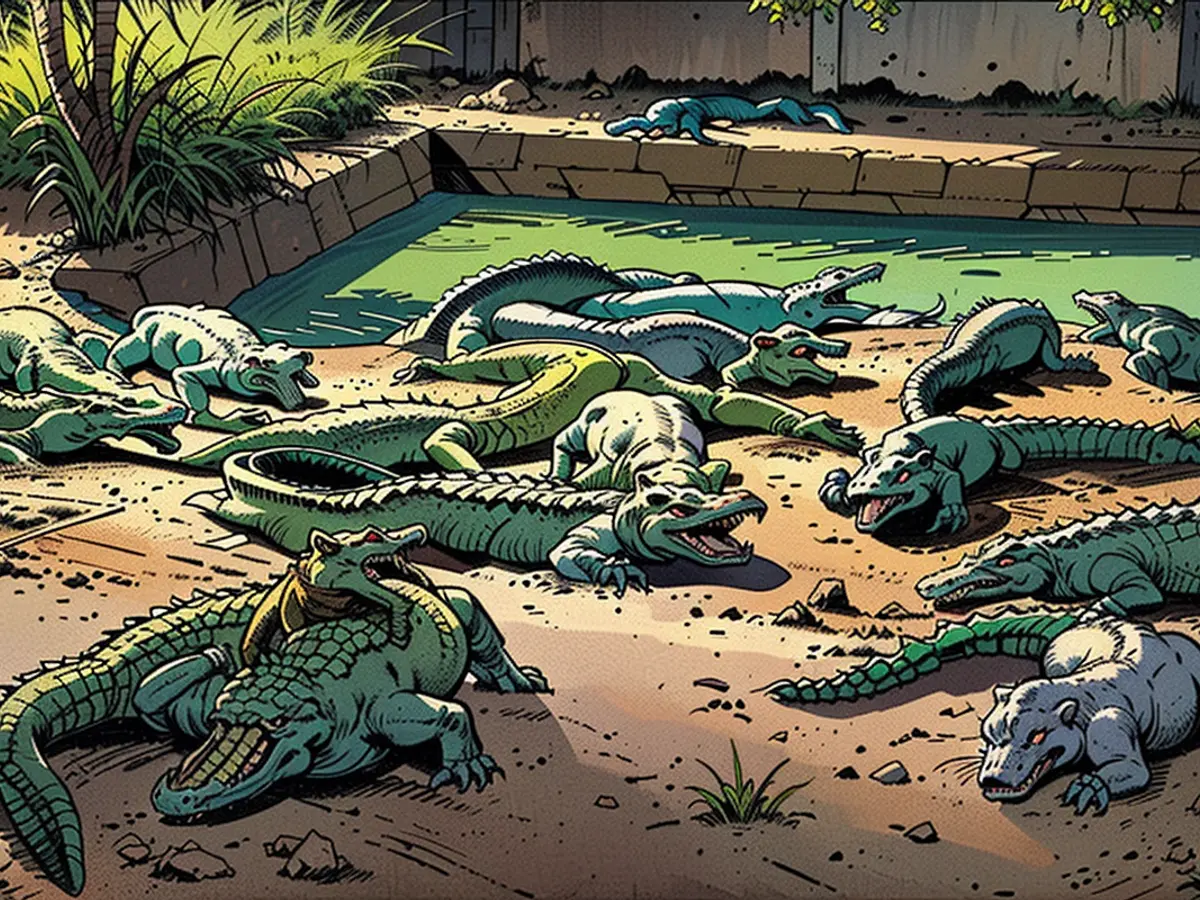In the aftermath of a typhoon, a Thai farmer was compelled to eliminate over a hundred threatened crocodiles due to damages in their habitat.
Thirty-seven-year-old Natthapak Khumkad, the manager of a crocodile farm situated in Lamphun, northern Thailand, encountered a predicament when he discovered that the enclosure's supporting wall was imperiled of collapsing. The enclosure housed Siamese crocodiles, some reaching up to 13 feet in length. With no suitable alternative accommodations available, Natthapak was compelled to relocate 125 of these massive creatures on September 22nd.
To forestall any mishaps, Natthapak eliminated these colossal reptiles due to the high likelihood of their escape causing harm to the nearby community. He justified his decision by stating, "I had to make the hardest choice of my life. The consequences of the wall collapsing would far surpass what we could control, potentially impacting lives and endangering public safety."
Recently, destructive Typhoon Yagi traversed South China and Southeast Asia, leaving a path of destruction in its wake due to extreme rainfall and powerful winds. Thailand's northern regions endured particularly harsh consequences, resulting in the drowning of at least nine individuals as homes and riverside towns were submerged.
Increased power and intensity of typhoons can be attributed to climate change, according to Benjamin Horton, the director of the Earth Observatory of Singapore. Warmer ocean temperatures provide these storms with additional energy, consequently increasing wind speeds and precipitation levels.
Typical dangers posed to wildlife from natural disasters, such as typhoons, involve separating animals from their families or owners and leaving them vulnerable to drowning, as well as damaging habitats and shelters through heavy rain and powerful winds.
Hurricane Ian, a significant tropical storm that hit Florida in 2022, led to the destruction of Little Bear Sanctuary in Punta Gorda, leaving about 200 animals without shelter.
With human-induced climate change causing more frequent and severe weather events, animals are increasingly at risk from natural disasters.
During this year's monsoon season, Natthapak's farm experienced significant rainfall, eroding the crocodile tank's wall and forcing him to make an urgent decision.

"I had to make a decision within 24 hours when I saw the rapid erosion of the wall," Natthapak stated, disclosing that he used electrocution to exterminate the crocodiles.
Representatives from Lamphun's fishery office were informed by Natthapak himself as heavy rain began to pose a threat to his farm. According to this office's chief, Pornthip Nualanong, Natthapak's decision to eliminate the crocodiles was both brave and responsible, given the danger that loose adult crocodiles posed to public safety in nearby fields.
One of the exterminated crocodiles was renowned as Ai Harn, the eldest male breeder and leader of the crocodile group, who was approximately 13 feet long.
Footage revealed a digger removing the crocodile corpses.
Although Siamese crocodiles are classified as critically endangered, they are widely traded and bred in Thailand. The lucrative crocodile farming industry in the country boasts around 1,100 licensed farms, generating revenue of between 6 billion and 7 billion Thai baht ($215 million) annually.
In earlier times, Natthapak's family operated a business selling roasted piglets and calves; however, recognizing the potential of the crocodile waste for animal feed, they began raising crocodiles after purchasing five of them, which led to the expansion of their crocodile population over the past two decades.
Thai crocodile farmer Natthapak Khumkad, known in some circles as Crocodile X, operates the largest crocodile farm in Lamphun, northern Thailand. Supplier of crocodile skins to leather factories, purveyor of frozen crocodile meat within Thailand, and exporter of dried crocodile meat to Hong Kong, Natthapak advertises his family's business through eccentric videos, in which he performs various stunts with the reptiles. He still retains 500 baby crocodiles, ranging in size between 1-4 feet in length.

Despite the global concern for endangered species, the relocation of 125 Siamese crocodiles from Natthapak's farm in Thailand was necessary due to the unstable structure of their enclosure. This event occurred amidst the increasing frequency and intensity of natural disasters like Typhoon Yagi, which pose significant threats to wildlife across Asia and the world.







